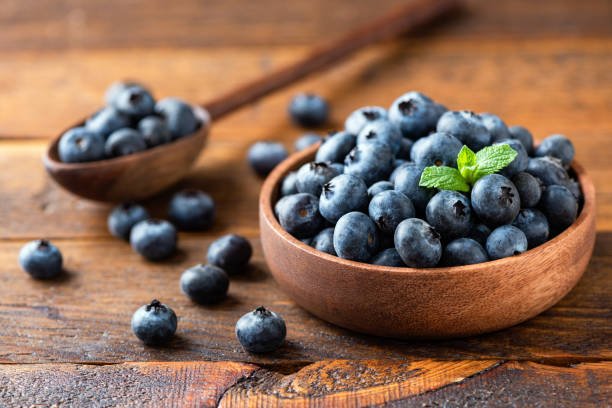
The Wonders of Bilberry: An Ayurvedic Perspective
Bilberry, a small, dark blue fruit closely related to blueberries, has been cherished in traditional medicine for centuries, particularly in Ayurveda. This document explores the myriad health benefits of Bilberry, the diseases it can help alleviate, methods of consumption, availability, and essential precautions to consider when using this potent fruit.

What is Bilberry?
Bilberry (Vaccinium myrtillus) is a perennial shrub native to Europe and North America. The fruit is rich in antioxidants, particularly anthocyanins, which give it its deep blue color. Traditionally, Bilberry has been used to support eye health, improve circulation, and enhance overall well-being.

Health Benefits of Bilberry:
Eye Health: Bilberry is renowned for its ability to improve vision and reduce eye strain. The antioxidants in Bilberry may help protect the retina and improve night vision.
Anti-Inflammatory Properties: The anti-inflammatory compounds in Bilberry can help reduce inflammation in the body, potentially alleviating symptoms of arthritis and other inflammatory conditions.
Cardiovascular Health: Regular consumption of Bilberry may help lower blood pressure and improve cholesterol levels, contributing to better heart health.
Blood Sugar Regulation: Bilberry may assist in regulating blood sugar levels, making it beneficial for individuals with diabetes or those at risk of developing the condition.
Digestive Health: The fiber content in Bilberry aids digestion and can help prevent constipation.

Diseases Bilberry can help Cure:
Diabetes: By improving insulin sensitivity and regulating blood sugar levels.
Eye Disorders: Such as macular degeneration and cataracts.
Cardiovascular Diseases: By improving heart health and reducing cholesterol levels.
Inflammatory Conditions: Such as arthritis and other joint-related issues.

Ways to Consume Bilberry:
Bilberry can be consumed in various forms:
Fresh Berries: Enjoy them raw as a snack or add them to smoothies and salads.
Dried Bilberry: Use dried berries in teas, cereals, or baked goods.
Bilberry Extract: Available in capsules or liquid form, these supplements are concentrated sources of Bilberry’s beneficial compounds.
Bilberry Tea: Brew dried Bilberry leaves or berries in hot water for a soothing herbal tea.


Where to Find Bilberry?
Bilberry is available at our stores :
Stores
Bilberry can be found in health food stores, herbal shops, and online retailers. Look for fresh or dried berries, extracts, and teas. Ensure that you purchase from reputable sources to guarantee quality and potency.
Risks and Precautions:
While Bilberry is generally safe for most people, some precautions should be taken:
Allergic Reactions: Individuals with allergies to berries should avoid Bilberry.
Blood Sugar Levels: Those on diabetes medication should consult a healthcare provider before using Bilberry, as it may enhance the effects of these medications.
Pregnancy and Breastfeeding: Pregnant or breastfeeding women should consult a healthcare professional before consuming Bilberry.

Additional Information:
Bilberry has a long history of use in traditional medicine, particularly in Europe, where it has been used to treat various ailments. Its rich antioxidant profile makes it a valuable addition to a healthy diet. Incorporating Bilberry into your daily routine can provide numerous health benefits and support overall wellness.

In conclusion, Bilberry is a remarkable Ayurvedic product with a wealth of health benefits. By understanding its uses, benefits, and precautions, you can harness the power of this small but mighty fruit for better health.

